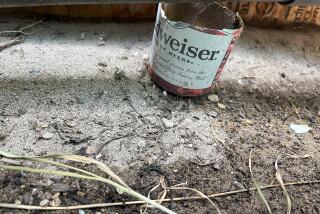Chinese Seek Truly Green Greengrocers
- Share via
BEIJING — Shiny red peppers, flawless lettuce, emerald-green broccoli--almost any vegetable can be found in perfect form in China’s open-air markets.
In all this abundance, however, is an invisible threat: haphazard use of farm chemicals that leave poisonous residues.
The Ministry of Agriculture is responding to rising concerns about food quality by promoting “green food,” certified as contamination-free.
“Living standards have gone up. Grain production has been basically solved. And people are more concerned with the quality of their food,” said Han Peixin, an official with the ministry’s organic foods division, China National Green Food Corp. Many Chinese farmers and consumers have been sickened by fertilizers and pesticides in recent years, Han said.
Chinese newspapers report cases like one in Guangzhou in 1996 when 112 people were hospitalized with dizziness, vomiting and stomach pains after eating fertilizer-tainted vegetables.
China has farm-chemical regulations that, if followed precisely, would leave only a negligible, safe residue on market vegetables, the Workers Daily quoted Zhou Changjiu of the China Agricultural University as saying.
But authorities are unable to control chemical use on small farms. When farmers find that pesticides or fertilizers don’t work, they tend to apply them more frequently or use something stronger, the state-run newspaper said.
The report said checks at a wholesale market in one city, which it did not identify, found residues in excess of national standards on half the produce.
Rising use of chemical fertilizers also has caused environmental damage: hardened soil, polluted water and fish kills.
The Ministry of Agriculture’s Green Food Development Center encourages farmers to supply safer food. It trains them to use traditional farming methods, such as compost for fertilizer, and biological controls, such as companion planting of crops that repel insects.
The center also puts its green and white logo on foods it certifies as having been grown with minimal amounts of nontoxic or low-toxicity chemicals on land that is free of industrial pollution.
With only one-third the world’s average farmland per capita, China must rely on agricultural chemicals to farm intensively. But it can replace some chemicals with other methods and meet a growing demand for safer food, said Han, the Green Food official.
“People in Beijing are concerned about residues of farm chemicals on their food, so the market for us is very good,” said Zhang Xiqing, manager of a national model farm outside Beijing.
Fred Eden of Canada and his wife, Li Nan, a Beijing native, buy vegetables raised in the farm’s greenhouses for their new organic foods market in Beijing. Some of their sales go to restaurants that advertise pollution-free food.
“We started because we met so many people who were afraid to buy the vegetables because of chemicals and night soil”--human waste used as fertilizer, Eden said.
But food certified uncontaminated still represents less than 1% of all food grown in China. Agricultural officials estimate consumers will pay no more than 5% extra for it.
“There’s such a small amount of green food now because we have to be certain that it’s pure,” said An Qin, another Green Food center official. “We’d rather have less and really be sure of its origins.”
More to Read
Sign up for Essential California
The most important California stories and recommendations in your inbox every morning.
You may occasionally receive promotional content from the Los Angeles Times.










